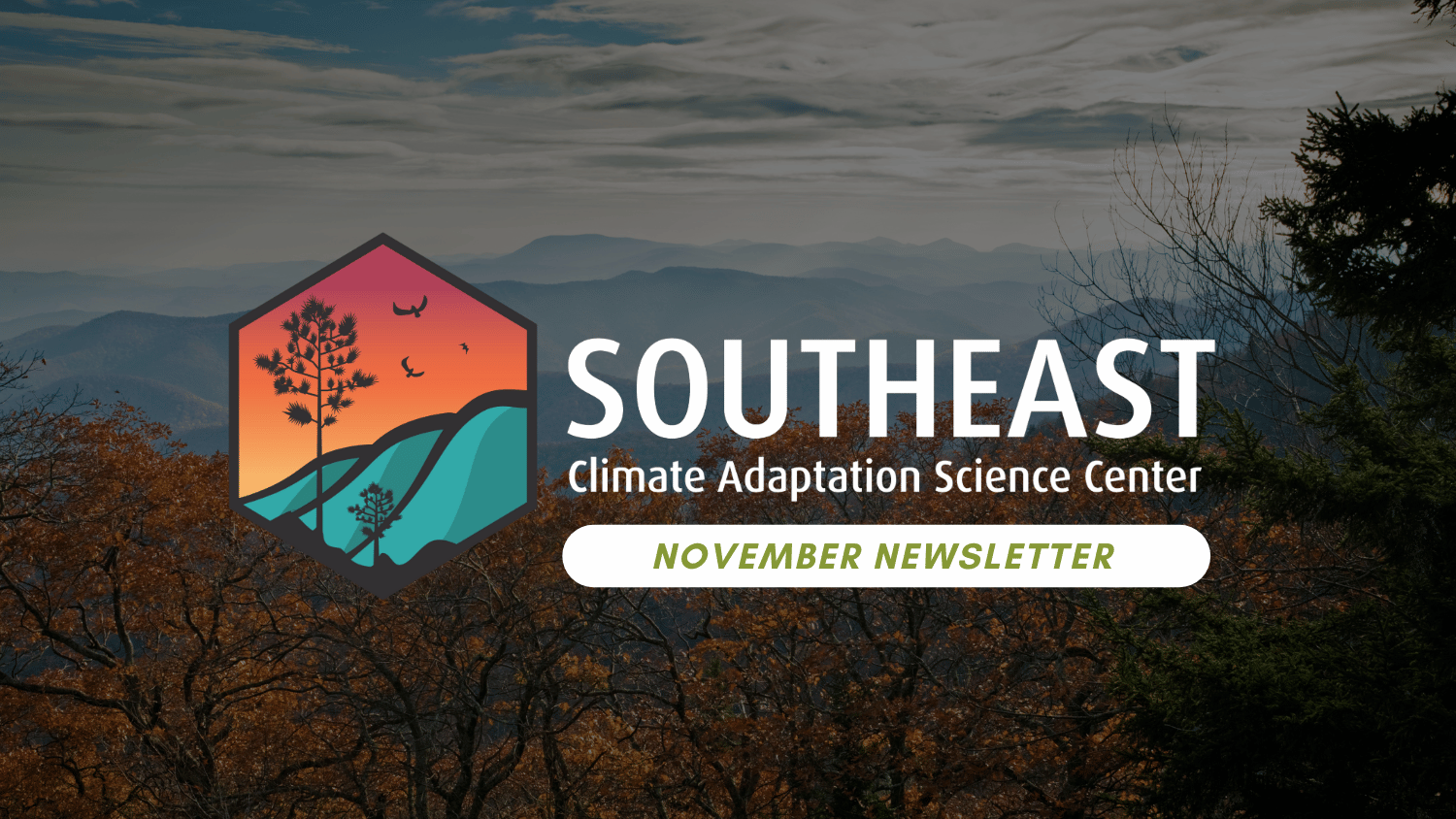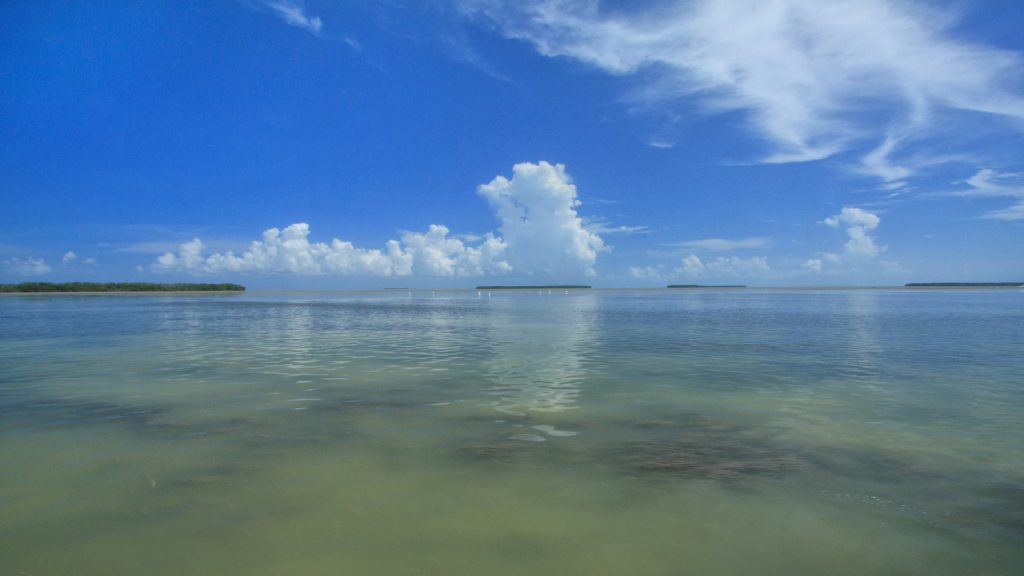November 2023 Newsletter

Welcome to the Southeast Climate Adaptation Science Center’s November 2023 Newsletter.
For news and upcoming events related to the Southeast Climate Adaptation Science Center, subscribe to our monthly newsletter
SE CASC News | Resources | Publications | Tribal News | Partner News | Webinars | Events | Opportunities

Southeast Climate Adaptation Science Center News
Get ready for Thanksgiving and learn more about wild turkey research at the Southeast CASC here.
Join us for our next SE CASC Science Seminar, Climate Change Impacts on Brook Trout Populations in the Southeastern USA, by Project PI Yoichiro Kanno (CSU), Nov. 29, 11AM ET. Learn more and register.
View a summary and recording of the October Global Change Seminar, Translation of Science: From Research to Application and Adaptation, hosted by Global Change Research Fellows.
Mark your calendar for the December SE CASC Science Seminar, Results for the Southeast from the 2022 AFWA Climate Adaptation Survey Report, by Jacob Blandford (AFWA), Dec. 13, 11AM ET. Register.
Project PI Georgina Sanchez and Research Ecologist Adam Terando are co-authors to Spatially interactive modeling of land change identifies location-specific adaptations most likely to lower future flood risk, product of SE CASC project, Improving Scenarios of Future Patterns of Urbanization, Climate Adaptation, and Landscape Change in the Southeast. Read news release.
Researcher Spotlights: Learn more about Global Change Research Fellows, Myleigh Neill and Nathan Schunk.
Research Ecologist Adam Terando is co-author to Bayesian weighting of climate models based on climate sensitivity. Read blog post.
Global Change Research Fellow Thomas Thelen was awarded the 2023 Megan Cornog Highway Safety Scholarship. Read more here.
Consortium student Lauren Lyon wrote a guest blog documenting her experiences with SE CASC along with the Science to Action and Directorate Fellowship Programs. Read blog.
Consortium Co-PI Ryan Emanuel is author to book, On the Swamp: Fighting for Indigenous Environmental Justice.
Conservation Corridor: Biodiversity and the geography of climate.
Project Spotlight
Dynamic Reserve Design: Informing the Identification of High-Priority Lands for the Everglades Headwaters National Wildlife Refuge Considering Future Climate and Urbanization

Reserve design is a process that must address ecological, social, and political factors to identify parcels of land in need of protection to sustain wildlife populations and other natural resources. Making land acquisition choices is challenging because it occurs over a long time-frame and involves consideration of future conditions such as climate and urbanization changes. The Everglades Headwaters National Wildlife Refuge hosts several threatened and endangered species and habitats. This study combined a structured decision making framework, optimal solution theory, and forecasts of population growth from urbanization models to design optimal configurations for the refuge and to guide land acquisition prioritization. It was led by PI Stephanie Romañach, USGS. Learn more.
Resources
CRAVe is the Climate Registry for the Assessment of Vulnerability. Learn more.
Creating Co-Benefits Through Hazard Mitigation Planning and Water Resource Management. This web-based USEPA and FEMA training supports integration of water quality issues, water resource management, and nature-based practices into state/local hazard mitigation plans. Learn more.
Guidebook for Prescribed Burning in the Southern Region. Southern Regional Extension Forestry created this guide to simplify fire concepts from wind direction to atmospheric conditions, firing techniques, etc. Learn more.
Range-wide Conservation Plan for Longleaf Pine. The Longleaf Partnership Council developed this guide to promote functional, viable longleaf pine ecosystems. Learn more.
South Carolina Strategic Statewide Resilience and Risk Reduction Plan. This plan was developed by the South Carolina Office of Resilience to help prepare for extreme weather events. Learn more.
In the Media
As climate disasters mount, the world isn’t spending nearly enough to adapt | Washington Post
The Beekeepers Who Don’t Want You to Buy More Bees | NY Times
AI churns out lightning-fast forecasts as good as the weather agencies’ | Science News
Winter Outlook 2023-24: Awaiting Wetter Weather With El Niño’s Return | NCSCO Climate Blog

Notable Publications
The relationship between greenspace exposure and telomere length in the National Health and Nutrition Examination Survey
Living in greener neighborhoods may extend your life. This study explored the relationship between telomere length and neighborhood greenspace exposure of participants in the National Health and Nutrition Examination Survey. Exposure to neighborhood greenspace was strongly related to longer telomeres, the inactive sequences of DNA at the end of our chromosomes that protect our genetic information during cell division. Longer telomeres protect our cells against the effects of aging and can lead to longer life expectancies. The presence of air pollution and deprivation made the relationship between greenspace and telomere length non-significant, suggesting that several social factors also contribute to telomere length and our overall health. Link to article.
Positive tree diversity effects on arboreal spider abundance are tied to canopy cover in a forest experiment.
More tree diversity in our forests supports the abundance of important predators; spiders! An experiment at the Smithsonian Environmental Research Center in Edgewater, Maryland found that more complex tree communities support up to 50% more spiders when compared to single-species tree plots. This trend was even stronger in the summer months, and prey availability as well as canopy cover in the diverse tree plots was a strong factor in spider abundance. Planting strategies focused on more complex tree communities could support forest ecosystems and provide higher quality habitat for these vital predators. Link to article.
Exploring the emergence of a tipping point for conservation with increased recognition of social considerations.
Western conservation practices have long been focused on methods that exclude many communities and considerations of our colonial roots. This study found that there is a shift in the conservation field toward nature-based solutions, or the incorporation of social considerations in climate and conservation adaptation projects. Social factors such as colonization and systemic racism are a few examples of concepts that require greater integration into conservation practices in order to address concerns of justice and equity within the field. Link to article.
Machine Learning of Key Variables Impacting Extreme Precipitation in Various Regions of the Contiguous United States.
The effects of climate change suggest that weather patterns will become increasingly unpredictable, but machine learning could offer new opportunities to foresee precipitation patterns. A new study used machine learning methods to identify key variables that could help predict extreme precipitation intensity and frequency across the United States. Variables such as latent heat flux, relative humidity, and soil moisture are all factors that affect precipitation and these new methods could help us understand their impact across different regions as well as their likelihood of occurrence. Machine learning models could aid in decision-making processes for more resilient infrastructure and city-planning as the threat of extreme weather patterns increases. Link to article.
So, You Want to Build a Decision-Support Tool? Assessing Successes, Barriers, and Lessons Learned for Tool Design and Development.
The design of decision-support tools for conservation, research, and natural resource management from the U.S. Geological Survey (USGS) can be streamlined by five guiding principles suggested by this study. These principles include using an adaptive and iterative design process, collaborating across disciplines and organizations, engaging with the target users of the tool in development, developing an empirical understanding of the use and usability of the tool, and planning for the tool’s full life span. These principles provide guidance for researchers considering decision-support tools for conservation based on best practices learned from experiences of USGS managers. Link to article.

Tribal News
Visit USET Climate Change Headlines for updates on information regarding climate science events, funding opportunities, best practices, and highlights from across the USET region.
The 2023 White House Tribal Nations Summit will be held on Dec. 6-7 in Washington, D.C. Learn more and register by Nov. 27.
FEMA is currently updating its Tribal Mitigation Planning Policy and is seeking tribal consultations. Learn more and submit written comments by Nov. 30.
ATNI Annual Convention is accepting recommendations for discussion topics. Submit your suggestions by Dec. 8.
USDA Announces 2024 Tribal Scholarships and Fellowships to provide higher education opportunities and strengthen ties with tribal higher education institutions. Learn more.
Young Tribal Leaders Art Contest. The Bureau of Indian Affairs (BIA) Division of Environmental Services and Cultural Resources Management is hosting an art contest to highlight Native youth and young professionals. Learn more.

Regional Partner News
U.S. Global Change Research Program Releases Fifth National Climate Assessment.
NOAA: 2023-24 U.S. winter outlook: wetter South, warmer North.
National Fish and Wildlife Foundation Announces $141.3 Million in Grants from the America the Beautiful Challenge.
National Integrated Drought Information System: Expanded Drought.gov Tool Visualizes Historical Drought Conditions by County, State.
Southeast Conservation Adaptation Strategy: Indicator spotlight – Equitable access to potential parks.

Webinars
Find more upcoming events in our calendar.
Nov. 27 | 3pm-4pm | NCA5 Webinar: Overview
Nov. 29 | 12pm-1pm | Lunchtime Discovery: The Good, the Bad and the Bugly
Nov. 30 | 2pm-3pm | Estuaries past, present and future: Using elevations and historical maps to characterize estuarine habitats across 30 National Estuarine Research Reserves
Nov. 30 | 3pm-4pm | NCA5 Webinar: U.S. Caribbean
Dec. 6 | 12pm-12pm | NCA5 Webinar: Southeast
Dec. 7 | 9am-10am | Climate & Conservation Coffee (virtual)
Dec. 12 | 10am-12pm | Exploring Livestock Grazing for Coastal Habitat Management Webinar
Dec. 12 | 1pm-2:30pm | NW CASC CV ReWorkshop: Updating Your CV to Contextualize Your Contributions in Societally Engaged Research
Dec. 13 | NE CASC Seminar – Ripple Effects of Dissolved Oxygen Depletion in Temperate Lakes under Climate Change
Upcoming Events
Dec. 2-6 | Eco Summit + Expo | Sarasota, FL
Jan. 30-31 | International Invasive Species and Climate Change Conference | Virtual
Feb. 6-8 | 2024 SAF Rising Professionals Conference | Baton Rouge, LA
Feb. 27-29 | Southwest Adaptation Forum | Tucson, AZ
Mar. 20-21 | WRRI Annual Conference | Raleigh, NC

Opportunities
Student Announcements
CAST Undergraduate Research Experience is accepting applications for the summer 2024/2025 cohort. Learn more and apply by Dec. 31.
ITEP is hosting a Tribes and Climate Change Program Summer Internship at Camp Colten. Learn more and apply by Jan. 15.
Sea Grant is accepting applications for the 2025 Knauss Fellowship Program. Learn more and apply by Feb. 15.
Hiring Announcements
The Eastern Ecological Science Center Data Management team is hiring. Learn more and apply by Nov. 27.
Alabama Water Institute and NOAA are advertising for an Assistant Research Professional – Southeast Regional Drought Information Coordinator. Apply here by Nov. 30.
NOAA’s Office for Coastal Management is seeking a full-time Coastal Management Specialist to support NOAA’s Office for Coastal Management (OCM). Learn more.
Funding Announcements
Science for Nature and People Partnership has opened their 2023 Request for Proposals. Learn more and apply by Dec. 15.
USDA Forest Service has opened the FY24 Southern Region Landscape Scale Restoration Request for Proposals. Submit your application by Dec. 15.
Field Inclusive is offering three research grants in the amount of $500 to support natural science field work. Learn more and submit an application by Feb. 1.
NC CASC and SW CASC are accepting qualified organizations to apply to host and, as applicable, serve as consortium partners. Learn more and submit applications by Feb. 1.
NOAA RESTORE Science Program and NCEAS are accepting proposals for the Gulf Ecosystem Initiative. Learn more and submit your application by Mar .15.
Miscellaneous
ITEP is looking for host sites for the ITEP Indigenous Climate Change Summer Internship Program. Learn more and apply by Dec. 1.
USGCRP is seeking author nominations and scientific/technical inputs for the First National Nature Assessment. Author call closes Jan. 24. Learn more.
AmeriCorps NCCC is accepting applications for team leaders and members of their Forest Corps. Learn more.
- Categories:
